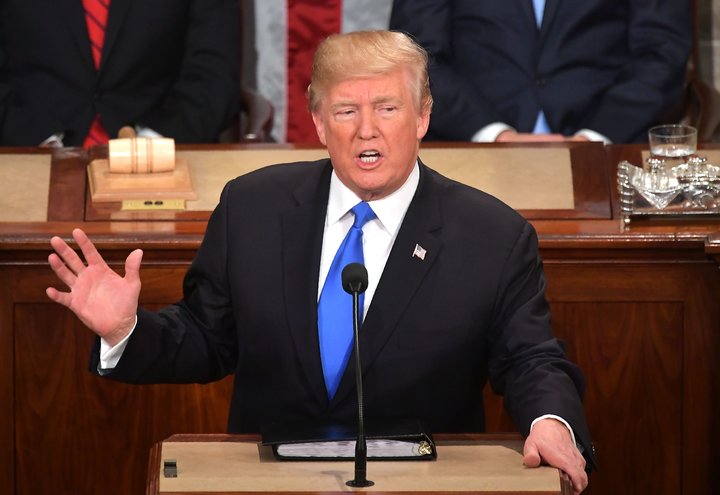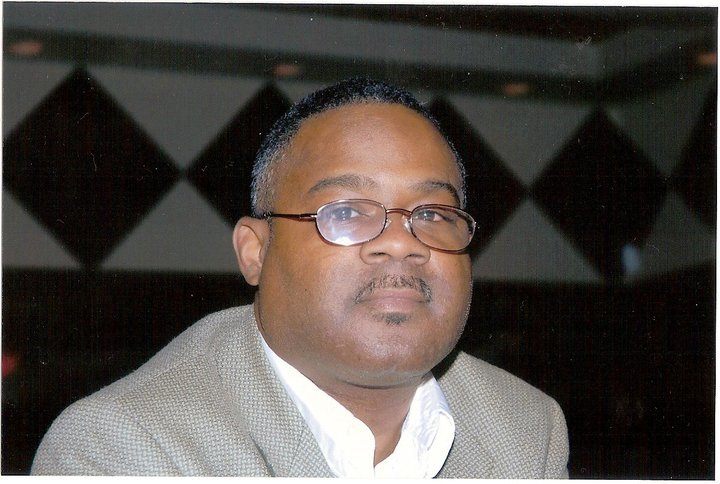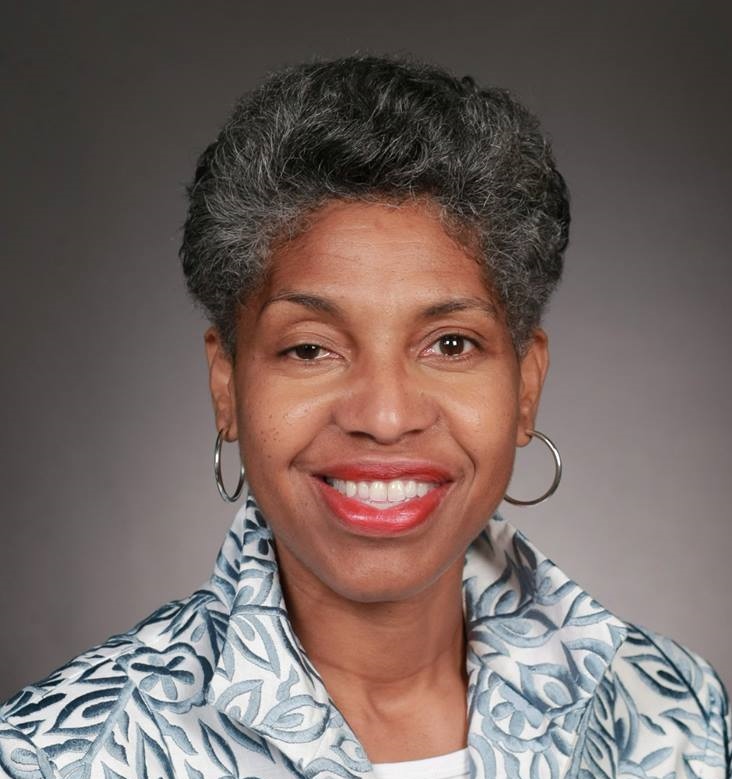
By Nick Baumann, Amanda Terkel, and Jessica Schulberg
The most important part of Trump’s State of the Union address is what he didn’t say.
President Donald Trump’s first State of the Union address was competently delivered and — for him — relatively inoffensive. The mainstream media and the television pundits will surely deem it to be a presidential moment, representative of yet another pivot to the center.
But one speech does not erase Trump’s record. The speech’s banality — its embrace of optimism and platitude — is a mask. Do not be fooled: Political extremism, divisive rhetoric and bizarre behavior have characterized the first year of Trump’s presidency and underlie many of the harmless-sounding proposals he talked about Tuesday night.
This is the president, recall, who rose to political power on the racist lie that his predecessor was born in Kenya, and he ran for president while calling to ban all Muslimsfrom the country and deriding Mexican immigrants as rapists. He was slow to denounce white nationalists, who have looked to him as a leader and marched openly in the streets of this country. And since last summer, this president has launched an all-out war on the investigations into Russian interference in the 2016 election — a war that continued to rage this week.
Trump mentioned none of those facts in his State of the Union address. Indeed, the speech was most notable for all of the policies and initiatives of his administration that he downplayed or left out entirely.
On immigration, his signature issue, the president called for compromise on the status of undocumented immigrants who came to the U.S. as children. But he failed to mention that the crisis that has beset these immigrants, known as Dreamers, is one of his own making. Last year, Trump canceled Deferred Action for Childhood Arrivals (DACA), which granted Dreamers renewable two-year deportation protections and work permits. Thousands of them have already lost their protections. Trump also didn’t talk about his unilateral cancellation of protected status for hundreds of thousands of Haitians, Nicaraguans, Salvadorans and Sudanese — people who have lived in the U.S. for years and will now have to leave. And he didn’t mention his three attempts to ban people from Muslim-majority countries from entering the U.S, the third attempt of which is due for a U.S. Supreme Court ruling later this year.
On the economy, Trump bragged about job growth and the Republican tax cut bill, but he didn’t mention that those tax cuts were overwhelmingly tilted toward the wealthy and corporations. He argued that the country is undergoing a “new American moment” under his presidency, promising, “There has never been a better time to start living the American dream.” He talked about bonuses and wage gains, but he certainly didn’t mention that the richest 5 percent of taxpayers would see the largest percentage increase in after-tax income under the law.
On defense, Trump bragged about U.S. success in the war against ISIS. But he didn’t mention that if he gets his way, transgender members of the military won’t be able to serve openly.
On North Korea, Trump described his policy against the hermit kingdom as “waging a campaign of maximum pressure” to prevent Kim Jong Un’s regime from acquiring nuclear weapons. That sounds like a reasonable — even presidential — thing to say. But it obscures the fact that Trump’s actual policy toward North Korea has been erratic and ineffective. Last year, North Korea tested a missile capable of hitting the U.S. mainland. Instead of pushing for nuclear negotiations, the Trump administration is reportedly considering a preemptive strike against North Korea — which nonproliferation experts say would do little to deter the rogue state’s nuclear ambitions and would put millions in South Korea at risk of a retaliatory attack. Hours before Trump’s speech, The Washington Post reported that the Trump administration had dropped Victor Cha, a former White House official, from consideration to become the U.S. ambassador to South Korea because he had warned of the risks of a so-called “bloody nose” attack on North Korea.
On Iran, Trump asked Congress to “address the fundamental flaws in the terrible Iran deal.” Left unsaid was the fact that Washington’s European allies have already said they will not cooperate with an effort to unilaterally rewrite the terms of the Iran deal. The best-case scenario is that the U.S. ends up isolated as Iran, France, Germany, Britain, China and Russia continue abiding by the nuclear deal. The worst-case scenario is that Iran points to a U.S. violation of the agreement as an excuse to scrap the deal entirely and resumes production of weapons-grade nuclear material. And although Trump praised protesters in Iran “who rose up against the crimes of their corrupt dictatorship” and congratulated himself for voicing his support for the movement, he didn’t mention that he has spent months fighting in court to ban Iranians — protesters or otherwise — from entering the U.S. at all.
On nuclear weapons, the president suggested that “someday in the future there will be a magical moment when the countries of the world will get together and eliminate their nuclear weapons.” But privately Trump has expressed a desire for a nearly tenfold increase in the U.S. nuclear arsenal, NBC reported last year. His administration is now pursuing the development of new low-yield nuclear weapons, according to a leaked copy of the Nuclear Posture Review obtained by HuffPost.
On Guantanamo Bay, Trump actually described his policy: an executive order that effectively reverses his predecessor’s commitment to closing the offshore prison. But he managed to avoid threatening to send American citizens to the prison where an ad-hoc judicial system has replaced what most Americans would consider due process. And he made no mention of his past threat to restart a now-defunct torture program.
On social issues, Trump said hardly anything. His administration is no longer standing behind transgender students who want to use the restroom of their choosing, but you wouldn’t know from listening to his speech. He didn’t mention his support for a ban on all abortions after 20 weeks’ gestation or his decision to reinstate the Reagan-era global ban on funding organizations that offer abortion as a family planning option or Republicans’ multiple attempts to defund Planned Parenthood. He touted “faith and family” as the “center of the American life” but faces sexual misconduct allegations from a number of women — and he backed a Senate candidate who had been accused of sexually pursuing teenage girls.
The mood in the chamber ― at least on the GOP side ― resembled a monster truck rally. Republicans said they loved the speech. They enthusiastically cheered the many applause lines. They hooted. They hollered. They chanted “U-S-A,” with Rep. Matt Gaetz (R-Fla.) pumping his fist to the rhythm of the cheer and Rep. Jody Hice (R-Ga.) holding up a red “Make America great again” hat.
But on the Democratic side, many sat when Trump entered the chamber. Many others spent a considerable amount of time on their phones as the speech became the third-longest State of the Union ever delivered, at one hour, 20 minutes and 34 seconds.
Democrats hissed during some of Trump’s claims. One line that will likely stick in memory will be his assertion that “a single immigrant” could bring in “virtually unlimited numbers of distant relatives” through family reunification. And the only reason it will be remembered is because it is so brazenly dishonest in a speech that contained a number of misleading claims, such as the GOP tax cut being the largest of all time. (It’s not.)
Hanging over the whole speech, but never acknowledged, was special counsel Robert Mueller’s investigation into Russia’s interference in the 2016 election and what role Trump and his associates played in any sort of collusion.
Trump mentioned Russia briefly, only once, as a “rival” that challenges U.S. interests. But during the election, Trump’s campaign saw Russia as a potential ally. At campaign events, he repeatedly praised President Vladimir Putin and said he longed for a U.S. president who acted more like the strongman.
The Russia investigation is a constant in the White House. Mueller has already indicted four people connected to Trump, and the probe gets closer and closer to the president and whether he tried to obstruct justice by firing the FBI director. And it continues to shape, and undermine, the other actions Trump takes as president.
Trump said a lot — his speech was one of the longest State of the Union addresses ever. But what he didn’t say tells you everything.
Jenavieve Hatch contributed reporting
Do you have information you want to share with HuffPost? Here’s how.











